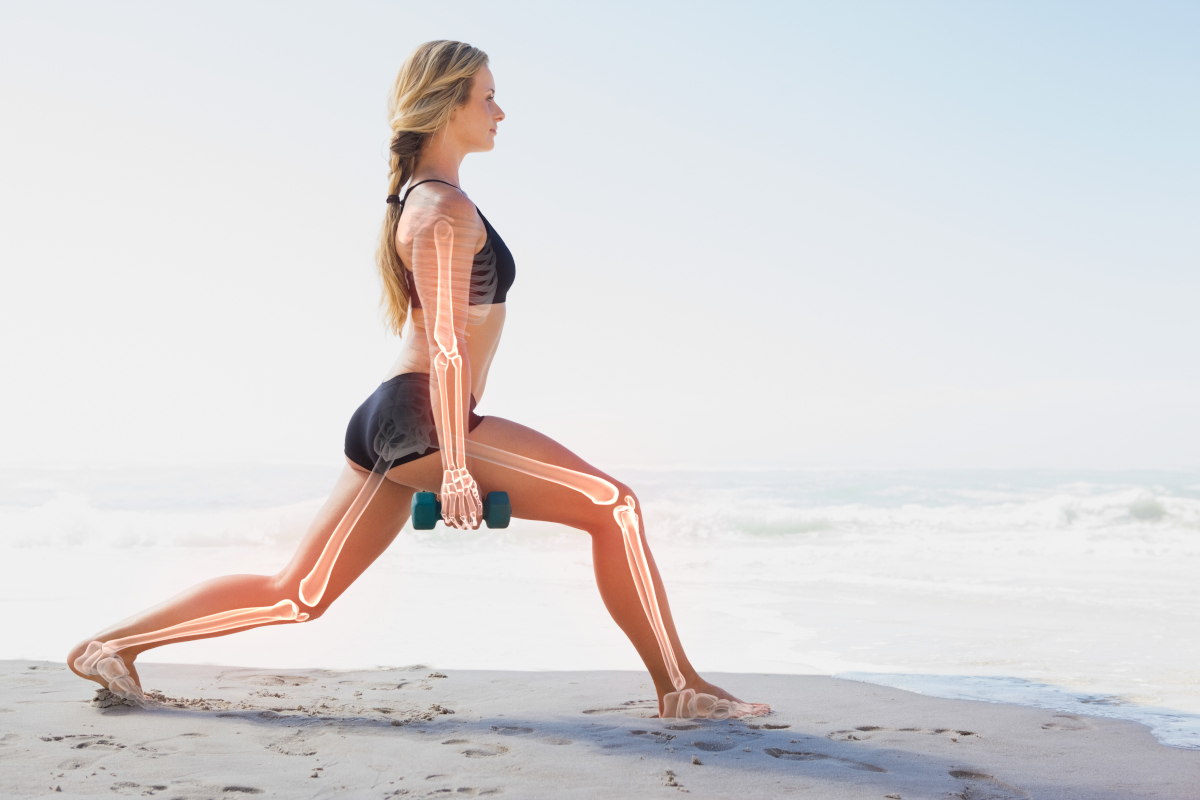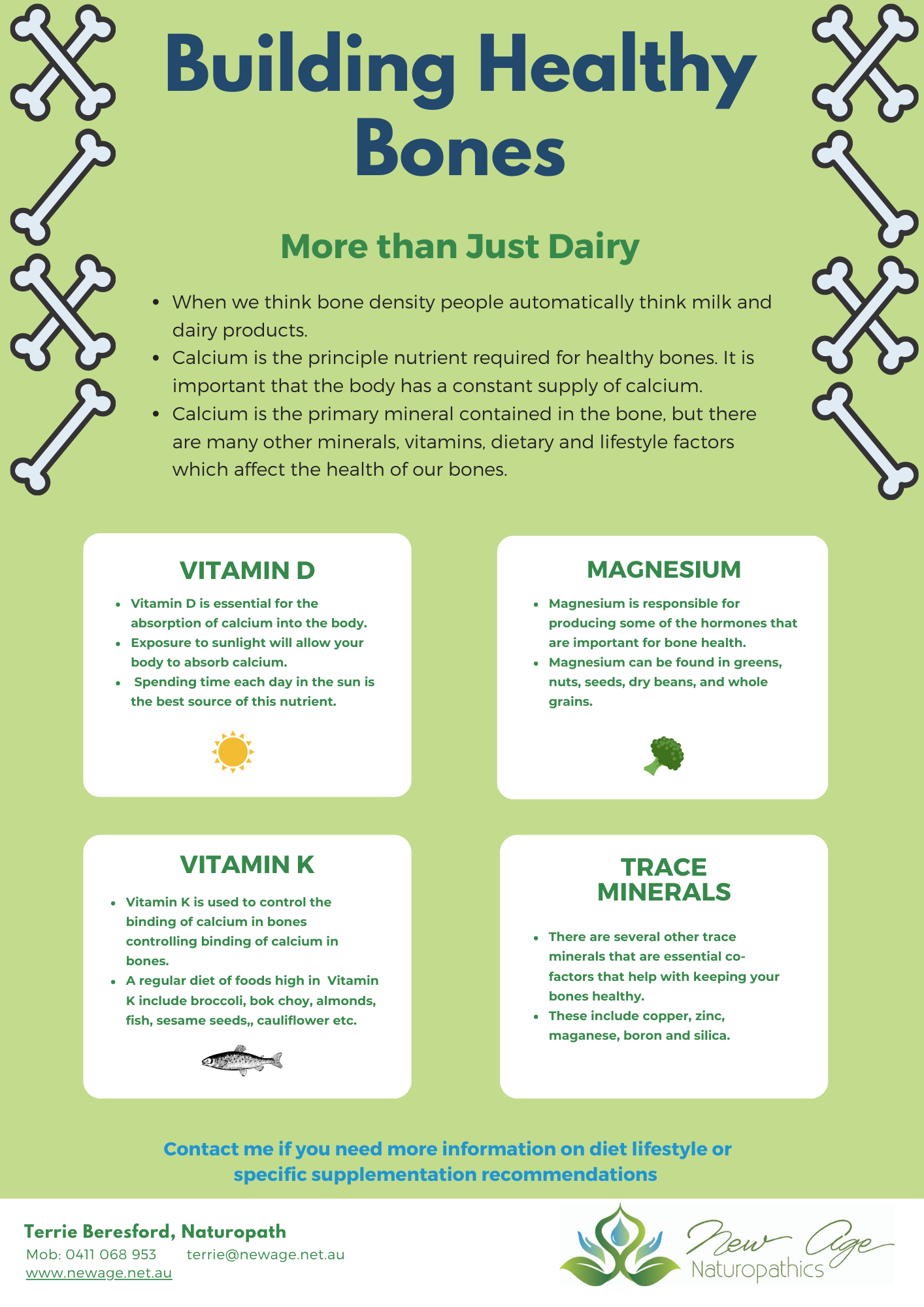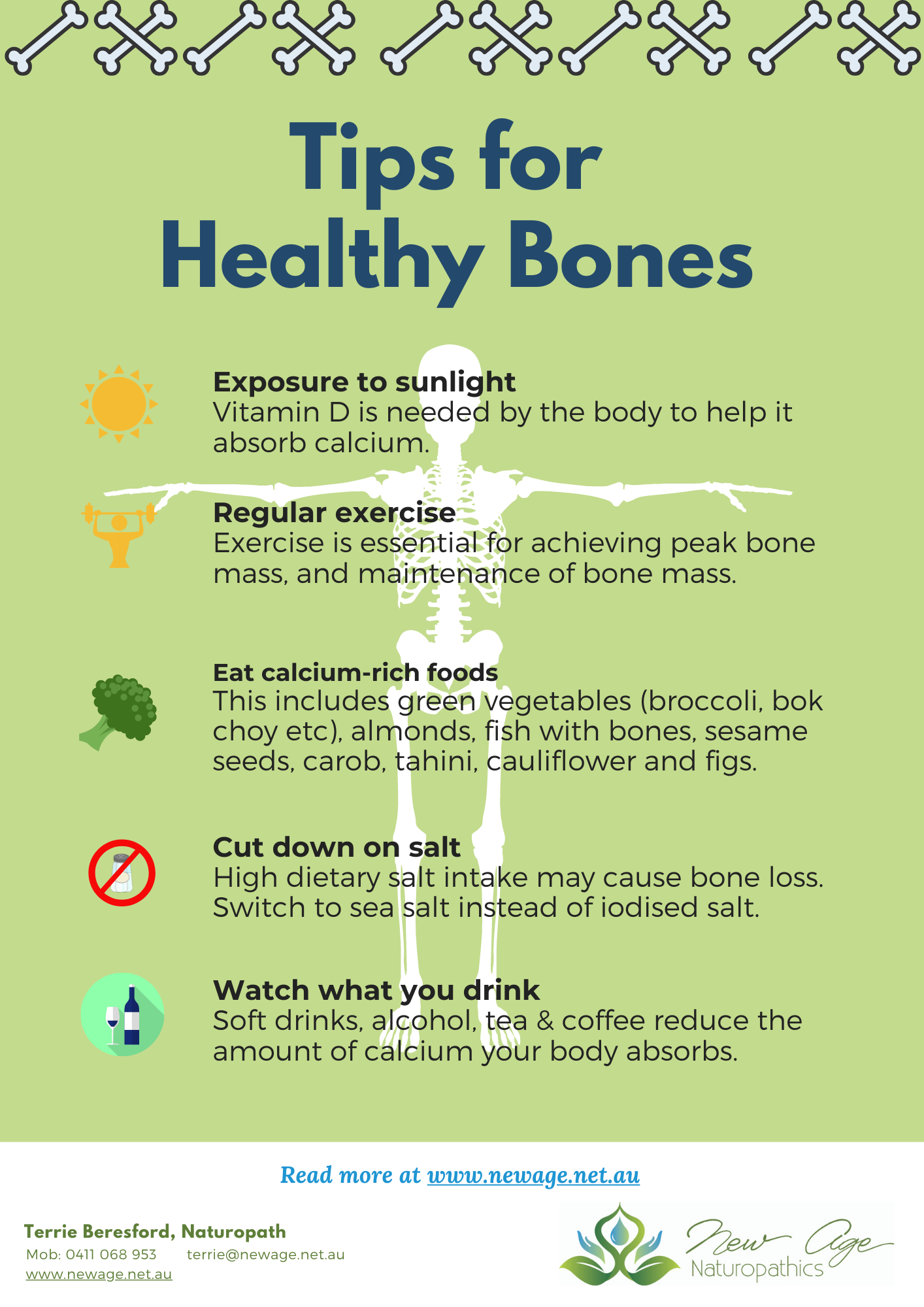As a Sydney Naturopath, I believe that building healthy bones is important, as your bones reflect the total health of your body. There is more to it than just increasing your calcium supplements.
Unfortunately, Osteoporosis is an ever-increasing problem in Western societies. This debilitating problem is only set to get worse as people continue to live longer. The general consensus is that calcium is the principle nutrient required for healthy bones. Whilst it is true that calcium is the primary mineral contained in bone, there are many other minerals, vitamins, dietary and lifestyle factors which affect the health of our bones. This article will discuss these in detail.
Seventy percent of bone is composed of minerals. The remaining 30% consists of a matrix of collagen and non-collagenous substances called osteoid. As previously discussed the mineral component contains primarily calcium as well as small amounts of magnesium, sodium, potassium, fluoride and chloride. Bone is in a constant state of turnover called remodelling. As a result it is important that the body has a constant supply of calcium and the other minerals from the diet.
Vitamin D is important for healthy bones as it is one of the principal regulators of bone remodelling and mineralisation. As the level of calcium in the blood declines, the kidney under the influence of hormones converts vitamin D to its active form, which when released enhances the absorption of calcium into the bloodstream (from the intestines and kidneys) which is then incorporated into bone. Vitamin D also plays a role in the production of growth factors which are required for healthy bone function. Insufficient vitamin D leads to reduced calcium absorption, increased rates of bone turnover and reduced bone mineralisation. This is a very important point as Vitamin D deficiency is at record levels not only in the elderly but in women and men of all ages.
Other minerals which are important for healthy bones include:
-
Magnesium which is required for mineral homeostasis as well as the activation of vitamin D.
-
Vitamin K required for the production of osteocalcin, one of the most abundant non-collagenous proteins found in the osteoid of bone. Osteocalcin facilitates calcium binding to the hydroxyapatite matrix in bone.
-
Several trace minerals especially copper, zinc, manganese, boron and silica are essential co-factors for specific enzymes required for osteoid development and bone mineralisation.
Several other hormones influence bone remodelling to a lesser extent including estrogens, androgens, progesterone, stress hormones such as adrenaline and noradrenaline and thyroid hormone. Estrogen reduction at menopause leads to a reduction in bone mass.
Natural Treatment for Osteoporosis
From a naturopathic point of view, we believe that the health of the skeleton is a reflection of the total health of the body. Thus we do not treat just the skeleton but take into account the whole being. Furthermore, we believe that osteoporosis is a preventable condition if the obstacles to normal skeletal homeostasis are removed. As a result, we take into consideration all the factors which may affect bone health and calcium absorption and intake including genetic predisposition, acid-base balance, physical activity, nutrient intake, smoking, medications, weight fluctuations, hormonal and local bone factors.
While sodium is absorbed by the body with 100% efficiency, calcium absorption is only 25-30% and is further reduced by dietary and lifestyle factors like lack of exercise, smoking and excessive intake of sugar, carbonated drinks, tea, coffee, and alcohol, etc. This percentage also reduces with age. In order to increase calcium absorption we use herbal supplements, digestive enzymes, probiotics, fibre, detoxification programs, in order to promote proper digestion and elimination.
How Much to Supplement?
Studies of calcium and bone mass in adolescents, young adults, older men and post menopausal women show supplementation of 500 – 1500 mg of elemental calcium along with 250-750 mg of elemental magnesium increase bone density. For post menopausal women, pregnancy, and women over 50 years of age we would recommend 1000- 1500mg/day. The inability to absorb calcium is a major reason that calcium therapy fails to prevent or slow the progression of osteoporosis. In order to ensure optimal calcium absorption 400-1000 IU of vitamin D3, it should also be a part of the supplement regime. Deficiency is also becoming an increasing problem with the increased use of sunscreens, soaps and body wash, which significantly reduce skin production of vitamin D. In addition, the other minerals that are important for healthy bone metabolism include boron, zinc, manganese, vitamin K and silicon. There are many good supplements on the marked which include all the essential vitamins and minerals for healthy bone growth and maintenance.
What to Eat?
As we all know:
-
Calcium is one of the main minerals stored in our bones. When we think bone density people automatically think milk and dairy products. However, there are many other good sources of calcium which are healthier alternatives to modern day diary. These include vegetables such as broccoli, bok choy, almonds, fish with bones (sardines, salmon, mackerel), sea vegetables, sesame seeds, carob, tahini, cauliflower, and figs.
-
High Phosphorus intake can cause a significant calcium imbalance. Phosphorus is present in high quantities in protein-containing foods, dairy products, grains and soft drinks.
-
Sodium causes increased urinary excretion of calcium. Short-term increases in dietary salt result in increased urinary calcium loss, so over time, high dietary salt intake may cause bone loss. Switch to sea salt instead of iodised salt.
-
Acid vs. Alkaline diet: Diets high in acid forming foods reduce bone density, as bone is broken down to provide calcium and other minerals to buffer the acidity in the blood. As the bone is resorbed there is no compensatory mechanism of bone formation thus a net loss of bone. Foods which cause the blood to become over acid include coffee, tea, alcohol, sugars, dairy products and particularly red meat, grains particularly refined flours such as wheat and processed foods. By contrast foods which create an alkaline ash include green leafy vegetables, most fruits, sea vegetables, almonds and some legumes. Of course balance and moderation is the key!
Cigarette Smoking depletes the body of Vitamin C and exposes it to a number of toxins including cadmium and lead which directly damage bone and interfere with calcium absorption.
Move it or Lose it
Exercise is essential for achieving peak bone mass as well as maintenance of bone mass. In particular weight bearing exercise such as walking, weights and yoga postures which pull on the bone stimulate additional bone remodelling. A study of postmenopausal women with osteoporosis combining both strengthening exercises and walking showed the women who exercised had increased bone density by 4.4% while those on bone restoring medicines only increased by just 1.6%.
Medications
Some medications may also adversely affect bone health. Some of the more common ones include: steroids, antacid medications, thyroid replacement medications, heparin, lithium, chemotherapy, and diuretics.
For more information on diet lifestyle or specific supplementation recommendations to protect your bones, consult a qualified health practitioner like myself.
Here are two infographics you can use as quick reminders of how you can build healthy bones.





